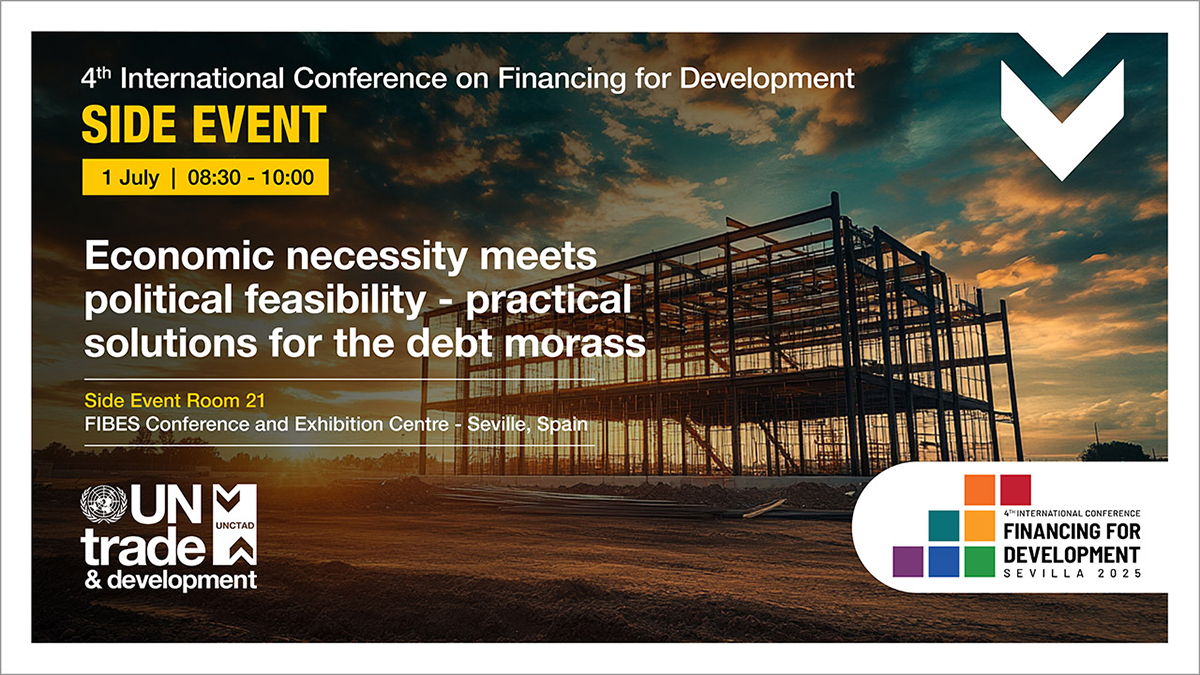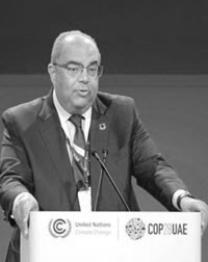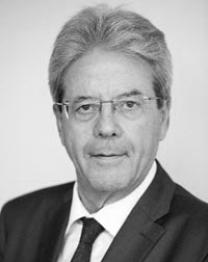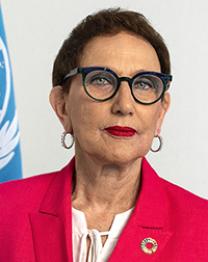
The Fourth International Conference on Financing for Development comes at a pivotal moment in the global effort to deliver on the SDGs. With less than five years remaining until 2030, the international community faces a narrowing window to mobilize the financing required to meet its commitments. Yet rather than accelerating progress, a mounting debt crisis is threatening to undo hard-earned development gains and derail the 2030 Agenda.
In 2023, developing countries spent a record $1.4 trillion on external debt service—nearly 4% of their gross national income. Over half of the countries eligible for the IMF’s PRGT are now in debt distress, more than twice the number in 2015. While many countries have so far managed to avoid outright default, it has come at a steep cost to development. Rising interest rates and shrinking fiscal space are forcing governments to choose between meeting their debt obligations and funding essential public services. Today, 3.3 billion people live in countries that spend more on debt service than on health or education.
The need for urgent, coordinated action is clear. Yet, while there is no shortage of ideas, implementation of financing for development solutions to comprehensively address these debt challenges has remained unfulfilled. The core challenge lies not in the technical feasibility of proposals, but in their political feasibility: fragmented interests, insufficient incentives, and institutional inertia continue to hinder progress.
This panel discussion brings together members of the UN Secretary-General’s Expert Group on Debt whose work has been to translate technical proposals into practical policy actions.
The conversation will focus on the politically viable solutions to the debt and development crisis, and pathways to implement them effectively.
As FfD4 looks to chart a new course for development financing, this conversation aims to identify what is needed not only to lift countries out of the debt morass, but to restore momentum toward achieving the SDGs and getting global development back on track.
In September 2021, Rebeca Grynspan was appointed Secretary-General of the United Nations Conference on Trade and Development (UNCTAD), becoming the first woman to lead the organization in its 60-year history.
Rebeca Grynspan, an economist and former Vice President of Costa Rica, is an experienced leader of international institutions with a substantive track record in government, UN diplomacy, economic policy and multilateral cooperation at the global level.
Prior to joining the United Nations, she was Vice President of Costa Rica and held cabinet positions as Minister of Housing, Minister Coordinator of Economic and Social Affairs and Deputy Finance Minister.
Previously, she served as Secretary-General of the Ibero-American Conference (2014–2021), chairing regional summits of Heads of State and Government; United Nations Under-Secretary-General and Associate Administrator of the United Nations Development Programme (UNDP); and UNDP Regional Director for Latin America and the Caribbean. She was a member of the UN Commission for the Reconstruction of Haiti, representing the UN Secretary-General.
At UNCTAD, Grynspan has been at the centre of critical negotiations to address global trade and development challenges. She played a decisive role in the successful Black Sea Grain Initiative brokered between the UN, Türkiye, the Russian Federation and Ukraine, which enabled the safe export of over 32 million tons of grain, lowered global food prices by 22% and prevented millions from falling into food insecurity. She also leads the UN Global Crisis Response Group on food, energy and finance, and has represented the UN in G20 summits.
Her leadership has been recognized widely. In 2024, she received the Doha Negotiator of the Year Award for spearheading UN efforts to restore Black Sea trade routes. In 2025, Spain’s Ministry of Foreign Affairs, European Union and Cooperation awarded her the inaugural Isabel Oyarzábal Women in Multilateralism International Prize for her contribution to multilateralism.
Ms. Grynspan holds degrees in economics from the University of Costa Rica and the University of Sussex, and honorary doctorates from several European universities.

Dr. Mahmoud Mohieldin is an economist with more than 30 years of experience in international finance and development. He currently serves as the United Nations Special Envoy on Financing the 2030 Sustainable Development Agenda. Recently, he served as the UN High-Level Climate Champion for Egypt, and as Executive Director at the International Monetary Fund representing the Arab States and The Maldives. Previously, Dr. Mohieldin was the Minister of Investment of Egypt from 2004-2010, and afterwards served as the World Bank Group Senior Vice President for the 2030 Development Agenda, United Nations Relations and Partnerships.
Dr. Mohieldin held seats on several advisory and executive boards in the banking, research, academic and corporate sectors among others, including his role as chairman of the Africa chapter for the Glasgow Financial Alliance on Net Zero (GFANZ). He was a member of the Commission on Growth and Development and was selected a Young Global Leader of the World Economic Forum in 2005. Dr. Mohieldin is a Professor of Economics and Finance at the Faculty of Economics and Political Science in Cairo University and has been a member of its faculty for almost 30 years. In addition to that, he has held posts as a visiting Professor at several renowned Universities in Egypt, Korea, the UAE, the UK and the US.
Dr. Mohieldin holds a PhD in Economics from the University of Warwick, United Kingdom; an M.Sc. in Economics and Social Policy Analysis from the University of York, United Kingdom; a Diploma of Development Economics from the University of Warwick; and a B.Sc. in Economics from Cairo University. He has authored numerous publications and articles in leading journals in the fields of economics, finance, and sustainable development.

Paolo Gentiloni served as European Commissioner for Economy from 2019 to 2024.
In December 2024, the United Nations Secretary-General appointed him Co-Chair of the Group of Experts to Promote Policy Solutions for Resolving the Debt Crisis. He is also a nonresident Distinguished Fellow at the Brookings Institution.
Previously, he served as Prime Minister of Italy (2016–2018), Minister of Foreign Affairs and International Cooperation (2014–2016), and Minister of Communications (2006–2008).
From 2001 to 2019, Gentiloni was a member of the Italian Parliament, where he served as Chairman of the Broadcasting Services Watchdog Committee (2005–2006) and as a Member of the Foreign Affairs Committee (2013–2014).
Earlier in his career, he worked as a professional journalist and served as a Councillor for the City of Rome (1993–2000).
He was also one of the 45 founding members of the Democratic Party (Partito Democratico – PD) and led the party as its President from 2018 to 2019.
Born in 1954, he graduated in Political Science from La Sapienza University in Rome. His most recent book is La sfida impopulista (The (Un)populist Challenge, Rizzoli).
Trevor Manuel was the Minister of Finance in South Africa from 1996 to 2009, serving under three presidents. Prior to this, he was the first post-apartheid Minister of Trade and Industry from 1994 to 1996.
He is a member of the Prominent Expert Group appointed by the United Nations Secretary General for the FfD4 process.

Yan Wang is a Senior Academic Researcher with the Global China Initiative at the Boston University Global Development Policy Center and a member of the Prominent Expert Group appointed by the United Nations Secretary General for the FfD4 process.
She also works as a consultant to the World Bank Group, and previously worked as Senior Economist and Team Leader at the World Bank for 20 years and served as Coordinator of the OECD-DAC and China Study Group for two years (2009-2011). She is the author or coauthor of four books and dozens of papers and country reports and has twice received the prestigious Sun Yefang Award in Economics.
Having retired from the World Bank, her recent research has extended beyond her interests developed during her career at the Bank, covering development financing including but not limited to China-Africa cooperation, the spatial impact of Chinese investment in Africa, debt restructuring, green transformation and the quality of growth in the Global South countries.




